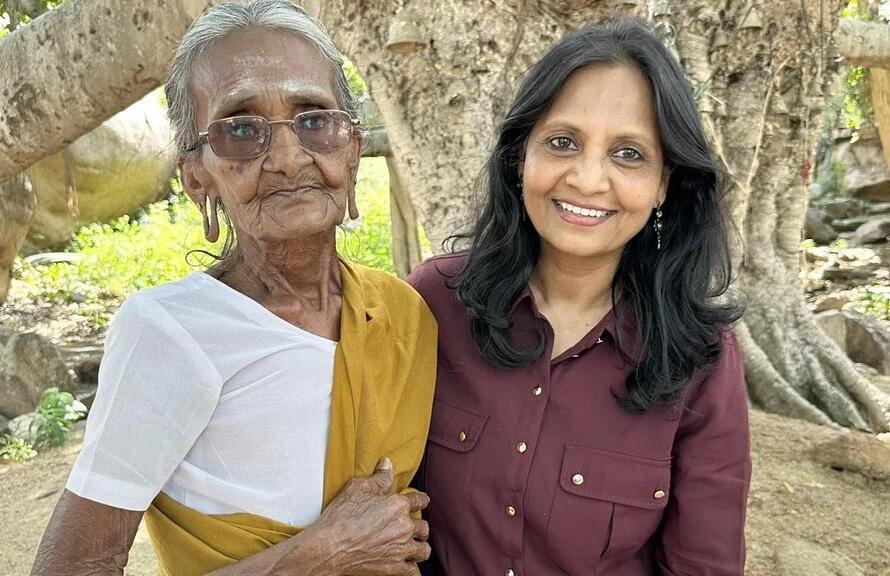In a transformative initiative, approximately 200 women, primarily from the Tharu tribe in Bahraich, Uttar Pradesh, have embraced organic farming to address their families’ nutritional needs.
Amidst the shadows cast by the pandemic, these resilient women, belonging to 35 self-help groups across six villages, embarked on a mission to uplift their communities while creating a potential avenue for additional income.
Following an alarming survey that revealed a sharp decline in the nutritional levels of vulnerable women due to the pandemic’s repercussions, the World Wildlife Fund-India (WWF) senior project officer, Dabeer Hasan, spearheaded an endeavor to empower these women.
Tharu Tribe Women in UP Foster Nutrition and Sustainability Through Organic Kitchen Gardening
The project aimed to equip them with the resources and knowledge needed to cultivate nutrient-rich vegetables in their own kitchen gardens, fostering self-sufficiency and sustainable livelihoods.

With dedicated orientation sessions and consistent guidance emphasizing the importance of nutrition, the initiative quickly gained traction, witnessing a significant surge in participants over two successful seasons. Notably, the women have gradually started contributing 25% of the project’s expenses, underscoring their dedication and determination towards this transformative journey.
The collaborative efforts of the WWF, Uttar Pradesh health department, and local horticulture authorities have bolstered the project’s impact, facilitating door-to-door surveys to monitor the women’s health progress and nutritional advancements. The seamless integration of expert guidance, quality seeds, and technical support has empowered these women to cultivate thriving gardens, yielding bountiful produce ranging from spinach, fenugreek, and cauliflower to peas, coriander, and carrots.

With a shared vision of promoting sustainability and fostering economic independence, the project envisions a future where these empowered women can harness the potential of organic farming to not only meet their families’ nutritional needs but also generate substantial income. As the project expands its horizons, the women are exploring innovative farming techniques, including the cultivation of long-shelf-life produce and the growth of mushrooms, setting a remarkable precedent for sustainable and community-driven initiatives in the region.
FAQ
- What is the primary objective of the organic kitchen gardening initiative led by Tharu tribe women in Uttar Pradesh?
The primary objective of the organic kitchen gardening initiative is to empower Tharu tribe women and their communities by providing them with the resources and knowledge needed to cultivate nutrient-rich vegetables in their own kitchen gardens. This initiative aims to address the nutritional needs of vulnerable families, particularly in the wake of the COVID-19 pandemic, while creating sustainable livelihood opportunities for the participants.

- How did the World Wildlife Fund-India (WWF) contribute to the success of the organic farming project?
The WWF played a pivotal role in spearheading the organic farming project by providing guidance, resources, and technical support to the participating women. Through its collaborative efforts with the local health department and horticulture authorities, the WWF facilitated door-to-door surveys to monitor the women’s health progress and nutritional advancements, ensuring a comprehensive and well-rounded approach to the project’s success.
- What kind of produce have the Tharu tribe women been able to cultivate in their kitchen gardens?
The resilient women of the Tharu tribe have successfully cultivated a diverse range of produce, including spinach, fenugreek, cauliflower, peas, coriander, radish, carrots, and turnips, among others. With the guidance of experts and the support of local horticulture authorities, these women have harnessed their skills to grow thriving gardens that yield high-quality, organic produce to meet the nutritional needs of their families and communities.
- How has the involvement of the Uttar Pradesh health department impacted the organic kitchen gardening initiative?
The active involvement of the Uttar Pradesh health department has significantly bolstered the organic kitchen gardening initiative, enabling the facilitation of door-to-door surveys to collect data on the nutritional progress of the women and their families. This collaborative effort has provided crucial insights into the project’s impact on the participants’ health and well-being, fostering a holistic approach to addressing their nutritional requirements and overall community development.
- What measures have been taken to ensure the sustainability and long-term success of the organic farming project?
To ensure the sustainability and long-term success of the organic farming project, the initiative has integrated comprehensive training programs, technical guidance, and resource allocation from the horticulture department and Krishi Vigyan Kendras. These measures aim to equip the women with the necessary skills and knowledge to practice sustainable farming techniques, cultivate produce with a longer shelf life, and explore innovative avenues for maximizing their agricultural output and economic independence.
- How have the Tharu tribe women managed to balance their domestic responsibilities with the demands of organic kitchen gardening?
Through dedicated orientation sessions and consistent guidance emphasizing the importance of nutrition and sustainable farming practices, the Tharu tribe women have successfully integrated organic kitchen gardening into their daily routines. By leveraging their expertise and the support of local authorities, these resilient women have harmoniously balanced their domestic responsibilities with the demands of cultivating thriving kitchen gardens, showcasing their commitment to fostering a sustainable and healthy lifestyle for their families and communities.
- What role does the local horticulture department play in supporting the Tharu tribe women’s organic farming efforts?
The local horticulture department plays a crucial role in supporting the Tharu tribe women’s organic farming efforts by providing essential resources, including high-quality seeds and saplings of various vegetables and fruits. Additionally, the department conducts comprehensive training programs, offers technical guidance, and periodically monitors the women’s progress, ensuring that they receive the necessary support and expertise to maximize their agricultural output and foster sustainable farming practices.
- How have the Tharu tribe women utilized the knowledge and resources provided by the World Wildlife Fund and the horticulture department to enhance their agricultural practices?
The Tharu tribe women have effectively utilized the knowledge and resources provided by the World Wildlife Fund and the horticulture department to enhance their agricultural practices and cultivate high-quality, organic produce. By implementing the guidance received through training programs and technical advice, these empowered women have successfully improved their farming techniques, resulting in healthier and more robust plant growth and a significant increase in their overall agricultural productivity.
- What are the future plans for the Tharu tribe women’s organic kitchen gardening initiative?
Looking ahead, the organic kitchen gardening initiative aims to further expand its reach and impact by fostering increased collaboration with the horticulture department and Krishi Vigyan Kendras. With a focus on promoting sustainable farming practices and exploring innovative agricultural techniques, the project envisions a future where the Tharu tribe women can continue to cultivate thriving kitchen gardens, generate substantial income, and serve as inspiring role models for sustainable and community-driven agricultural practices in their region.






